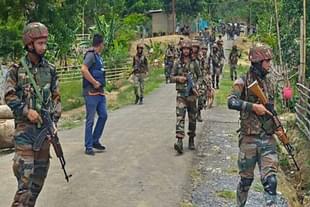Security
'Thin Line Between Commendation And Court Martial', Army Faces Challenges In Manipur Without Legal Protection By AFSPA
Ujjwal Shrotryia
Jul 10, 2023, 01:19 PM | Updated 01:19 PM IST
Save & read from anywhere!
Bookmark stories for easy access on any device or the Swarajya app.


According to Army sources, there is a significant limitation for security forces operating without the legal protection provided by the Armed Forces Special Powers Act (AFSPA) in Manipur.
They noted that while other security forces have experienced weapons being looted, there have been no instances of attempts to snatch weapons from Army troops.
The Army and Assam Rifles (AR) face compounded challenges in Manipur due to the absence of legal protection and cover under the AFSPA, said a source.
The source said, “the challenges being faced by the Army and Assam Rifles (AR) get compounded by the fact that the tasks being undertaken in this complex, volatile and charged up atmosphere are bereft of legal protection and cover of AFSPA".
"However, challenges notwithstanding, prompt and proactive actions by the Army have saved many lives in the State with zero collaterals so far," the source adds.
A young officer stationed in Manipur expressed the precarious situation, stating that “There is now a very thin line between a commendation and a court martial”.
Earlier In March, the Central government removed AFSPA from one district in Assam and from four police stations in Manipur.
This decision expanded the number of police-station limits without AFSPA to 19, covering seven districts in Manipur. Home Minister Amit Shah announced the reduction of "Disturbed Areas" under AFSPA in Nagaland, Assam, and Manipur was done due to significant improvement in the security situation in Northeast India.
Troops have been instructed to exercise self-restraint and avoid actions that may alienate the citizens of the country, even if it means withdrawing in the face of civil protests, the source said.
The Army's professional conduct has been evident in their maximum self-restraint, as seen in recent incidents where women activists blocked armed forces, causing delays and disruptions in operations, he said.
To maintain peace between the Meiteis and Kukis, buffer zones have been established and area domination patrols are being carried out.
However, instances of violence persist, with some cases involving the blocking of security forces' movements. The Army and the security forces are employing Unmanned Aerial Vehicles (UAVs), for monitoring and conducting operations.
More than 4,000 weapons, including automatic and high-calibre firearms, were looted from police stations. These incidents occurred primarily at Suspension of Operations (SoO) camps, creating a threefold problem, the source says.
Firstly, the miscreants now have easy access to these looted weapons, which has led to subsequent violence.
Secondly, the local police force is left without these weapons, limiting their effectiveness and lowering morale. Consequently, the Army and AR have taken on a greater responsibility.
Lastly, the source emphasised that the credibility of the local police and by extension the state government has been undermined.
The availability of looted weapons, such as Light Machine Guns, AK-47s, INSAS rifles, 7.62 mm Self-Loading Rifles, rocket launchers, and 51mm mortars, poses a significant threat as miscreants possess them in an already charged atmosphere.
Joint operations with local authorities have led to significant recoveries of weapons and ammunition, but there are still some weapons that have not been surrendered or recovered.
Another officer highlighting the foresight displayed by the Army's leadership said, "the Army was the first to respond, mobilizing 55 columns by air and road on May 3 and 4. This number increased to 111 columns by May 6 and 164 columns by the end of May".
"Currently, there are over 300 columns of Army, AR, and Central Armed Police Forces. Each column consists of 80-100 troops," the officer says.
"The Army's proactive deployment and early response, without waiting for formal requisition from the civil administration, helped control the arson, violence, and clashes from the beginning. This foresight and initiative prevented the situation from worsening and kept violence levels lower," the officer further adds.
In addition to the challenges mentioned, security forces are also struggling to transport replenishments and logistics to remote areas. Another major challenge is the spread of misinformation, which hampers efforts to restore peace.
A disinformation campaign is being conducted by all parties involved in the conflict. Both sides have accused the security forces, including the Army, of biased actions.
“This, in itself, underscores the neutrality of Army while exposing the motivated narratives. Army has been proactive in dispelling these allegations and many on the ground acknowledge our role,” a third source asserted.
Staff Writer at Swarajya. Writes on Indian Military and Defence.





